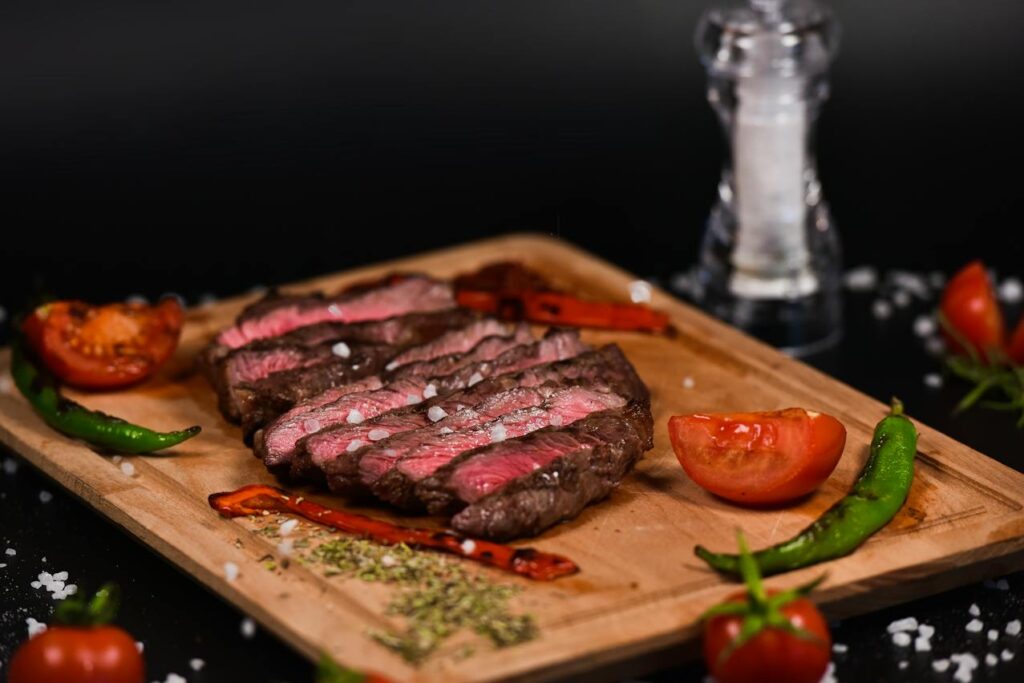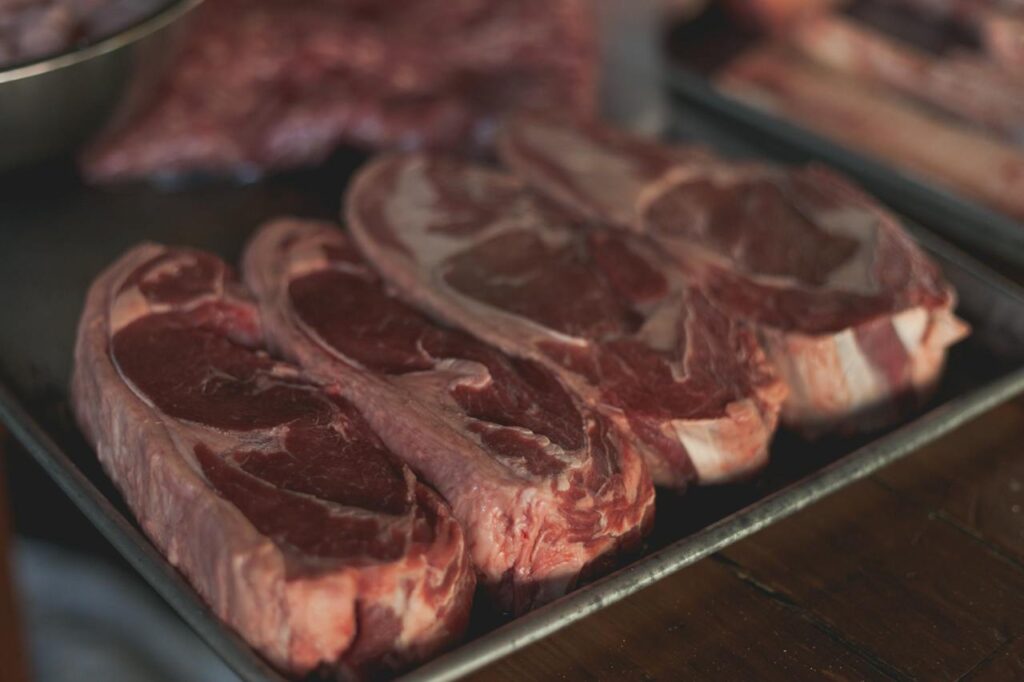Eating meat can be a great way to get protein, nutrients like B vitamins, iron, and zinc, and important fats into your diet. However, not all meats are created equal when it comes to nutrition. Some types of meat are packed with protein and important vitamins and minerals, while others mostly provide calories and sodium.

This guide will walk you through the nutrition tier list for various meats, from the superstars to the ones you may want to limit. We’ll cover the protein, cholesterol, calorie, and nutrient content so you can make informed choices. Let’s get started!
Meat Nutrition All-Stars: The S Tier
Salmon
Salmon is one of the nutritional superstars when it comes to meat. A 3-ounce serving provides 19g of protein along with anti-inflammatory omega-3 fatty acids. Salmon is rich in B vitamins, potassium, selenium, and vitamin D. At just 175 calories and 55mg of cholesterol per serving, salmon packs nutritional value without the baggage of saturated fat.
Chicken Breast
With 27g protein, vitamin B6, niacin, selenium, and phosphorus, a 3-ounce chicken breast is a lean and nutrient-dense choice. Calories are just 140 per serving with 72mg of cholesterol. Chicken breast can be a versatile and healthy addition to many meals.
Turkey Breast
Very similar to chicken breast nutrition-wise, 3 ounces of turkey breast has 24g protein, 56mg cholesterol, and just 120 calories. Turkey breast is an excellent source of selenium and also provides B vitamins.
Lean Beef
Cuts of beef like sirloin, round, and chuck are considered lean with less than 10g of total fat per serving. A 3-ounce serving of lean beef has about 22g protein, 70mg cholesterol, and provides iron, zinc, and B vitamins for just 150 calories.
Bison
Lower in calories and fat than beef, bison is an excellent alternative. A 3-ounce serving packs 22g protein and 82mg cholesterol along with iron, zinc, and vitamin B12.
Deer
Venison or deer meat is an extremely lean protein source, with only 120 calories and 1g of fat per 3-ounce serving. Deer meat has 25g protein, 70mg cholesterol, and provides iron, zinc, selenium, and B vitamins.

The Best Supporting Actors: A Tier Meats
Pork Tenderloin
With just as much protein as beef or chicken breast in a 3-ounce serving, pork tenderloin is a lean cut worthy of the A team. With less saturated fat than even chicken and 120 calories per serving, pork tenderloin provides protein, B vitamins, potassium and phosphorus.
90/10 Ground Beef
Ground beef with just 10% fat provides the iron, zinc, protein and B12 you expect from beef with less saturated fat at just 180 calories per serving. Opt for 90/10 ground beef for burgers and tacos rather than fattier versions.
Flank Steak
Flank steak is a lean, flavorful cut used often for grilling. With 21g protein and 173 calories per 3-ounce serving, it provides nutritional value without too much saturated fat. Offering zinc, iron, niacin and vitamin B12, flank steak can be a tasty addition to a healthy diet.
Eggs
One large egg has only 70 calories but packs 6g of protein along with iron, vitamins, minerals and carotenoids like lutein and zeaxanthin. Cholesterol is higher at 186mg per egg, but eggs can still be enjoyed in moderation as part of a varied diet.
Alligator
With its mild taste, alligator is growing in popularity. A 3-ounce serving has 18g protein, 80mg cholesterol and 140 calories. Alligator is an excellent low-fat source of vitamin B12, niacin and selenium.

The Middle of the Pack: B Tier Meats
Fattier Cuts of Beef
Ribeye steak and T-bone steaks are delicious but pack more saturated fat and calories than leaner cuts of beef. A 3-ounce serving of ribeye has 21g protein but 86mg cholesterol and 220 calories. You can still enjoy these fattier cuts of steak occasionally as part of a healthy pattern of eating.
Lamb
Lamb packs protein, B12, niacin, zinc and iron. However, lamb tends to be higher in saturated fat with 185 calories and 78mg cholesterol per 3-ounce serving. Work lamb into your diet in moderation.
80/20 Ground Beef
Although convenient and widely used, 80/20 ground beef is higher in saturated fat than leaner 90/10 or 93/7 options. Per serving you’ll get 18g protein but 70mg cholesterol and 225 calories. Use 80/20 ground beef sparingly or drain excess fat after cooking.
Bacon
With 40 calories and 7g protein per slice, bacon provides some nutritional value including B12, potassium and zinc. However, the high sodium content (190mg per slice) can add up quickly. Enjoy bacon occasionally rather than regularly.

The Nutritional Underdogs: C and D Tier Meats
Hot Dogs and Sausages
Highly processed hot dogs and sausages tend to be high in sodium, nitrates, and saturated fat. A typical hot dog has 140 calories, 5g protein, and 17mg cholesterol. Limit processed meats and opt for uncured sausages made with quality ingredients.
Deli Meat
Pre-packaged sliced deli meats run high in sodium, with over 600mg per 2-ounce serving. And with only 10g protein and 30mg cholesterol, deli meat doesn’t provide much nutritional value for those 60 calories per serving. When possible, choose freshly sliced meats.
Chicken Wings
While wings offer protein, iron and zinc, the saturated fat and sodium content add up fast. Just 3 wings delivers 150 calories, 70mg cholesterol and 300mg sodium. Wings are a good option for an occasional treat.
Pepperoni and Salami
Highly processed, fatty cured meats like pepperoni and salami provide protein but are heavy on sodium and preservatives. Per ounce, expect about 7g protein but 800-900mg sodium. Stick to a couple of slices on a pizza instead of making them a dietary staple.
Beef Jerky
While jerky can be convenient for hiking or as a snack, it’s high in sodium (over 1000mg per ounce). You’ll get around 9g protein but jerky doesn’t provide much nutritional value compared to whole food alternatives.

Focusing your diet on the more nutrient-dense cuts of meat like salmon, chicken breast, turkey, lean beef, bison, deer and alligator provides plenty of protein and minerals without excess calories or sodium. Moderate your intake of cured meats like bacon and pepperoni, fried chicken wings, and highly processed hot dogs, beef jerky and deli meats. With some discretion, you can enjoy the flavor and satiety of meat as part of an overall balanced diet.
Hey there! We hope you love our fitness programs and the products we recommend. Just so you know, Symku Blog is reader-supported. When you buy through links on our site, we may earn an affiliate commission at no extra cost to you. It helps us keep the lights on. Thanks.
Disclaimer: The information provided in this discussion is for general informational and educational purposes only. It is not intended as medical or professional advice. Only a qualified health professional can determine what practices are suitable for your individual needs and abilities.
